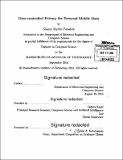User-controlled privacy for personal mobile data
Author(s)
Paradesi, Sharon M. (Sharon Myrtle), 1986-
DownloadFull printable version (7.974Mb)
Other Contributors
Massachusetts Institute of Technology. Department of Electrical Engineering and Computer Science.
Advisor
Lalana Kagal.
Terms of use
Metadata
Show full item recordAbstract
Smartphones collect a wide range of sensor data, ranging from the basic, such as location, accelerometer, and Bluetooth, to the more advanced, such as heart rate. Mobile apps on the Android and iOS platforms provide users with "all-or-nothing" controls during installation to get permission for data collection and use. Users have to either agree to have the app collect and use all the requested data or not use the app at all. This is slowly changing with the iOS framework, which now allows users to turn off location sharing with specific apps even after installation. MIT Living Lab platform is a mobile app development platform that uses openPDS to provide MIT users with personal data stores but currently lacks user controls for privacy. This thesis presents PrivacyMate, a suite of tools for MIT Living Labs that provide user-controllable privacy mechanisms for mobile apps. PrivacyMate aims to enable users to maintain better control over their mobile personal data. It extends the model of iOS and allows users to select or deselect various types of data (more than just location information) for collection and use by apps. Users can also provide temporal and spatial specifications to indicate a context in which they are comfortable sharing their data with certain apps. We incorporate the privacy mechanisms offered by PrivacyMate into two mobile apps built on the MIT Living Lab platform: ScheduleME and MIT-FIT. ScheduleME enables users to schedule meetings without disclosing either their locations or points of interest. MIT-FIT enables users to track personal and aggregate high-activity regions and times, as well as view personalized fitness-related event recommendations. The MIT Living Lab team is planning to eventually deploy PrivacyMate and MIT-FIT to the entire MIT community.
Description
Thesis: Elec. E. in Computer Science, Massachusetts Institute of Technology, Department of Electrical Engineering and Computer Science, 2014. Cataloged from PDF version of thesis. Includes bibliographical references (pages 81-82).
Date issued
2014Department
Massachusetts Institute of Technology. Department of Electrical Engineering and Computer SciencePublisher
Massachusetts Institute of Technology
Keywords
Electrical Engineering and Computer Science.